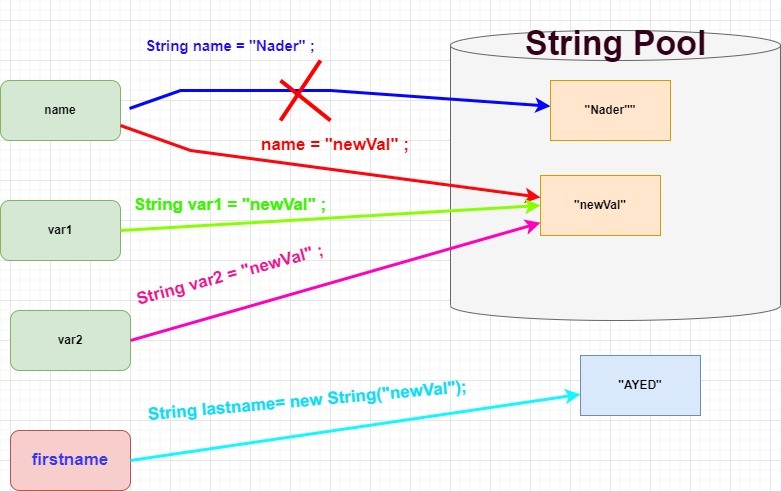Why Are Strings Immutable in Java? Insights right into Memory Effectiveness
Why Are Strings Immutable in Java? Insights right into Memory Effectiveness
Blog Article
What Is Unalterable Strings and Exactly How It Works
In the world of programs, recognizing the concept of unalterable strings is vital for producing durable and protected applications. Unalterable strings describe strings that can not be altered after they are created, ensuring data honesty and predictability within the code. This essential principle plays an important duty in various programming languages and uses a special approach to handling data. By checking out the ins and outs of just how unalterable strings work, one can discover a globe of advantages and possibilities that can boost the top quality and effectiveness of software program development.
The Fundamentals of Unalterable Strings
Unalterable strings, as a fundamental idea in programming, are character series that can not be changed as soon as they are created. This suggests that when a string is assigned a value, that worth can not be changed. In languages like Python and Java, strings are immutable things, causing different effects in terms of memory administration and data honesty.
Among the crucial advantages of immutable strings is that they provide a complacency in information control. Because the content of an immutable string can not be modified, it makes certain that the original data continues to be undamaged, lowering the threat of unexpected changes during program implementation (Why are strings immutable in Java?). This residential or commercial property likewise simplifies debugging processes, as developers can rely on that once a string is specified, its value will certainly not be inadvertently altered
Moreover, immutable strings assist in effective memory use. When a brand-new string is developed based upon an existing one, as opposed to modifying the original string, the new value is kept independently. This technique boosts efficiency by decreasing memory fragmentation and streamlining memory allocation procedures. On the whole, understanding the basics of immutable strings is critical for understanding shows principles and enhancing code efficiency.
Benefits of Immutable Strings
Building upon the protection and effectiveness benefits of unalterable strings, their advantages expand to improving code integrity and simplifying simultaneous shows jobs. By being immutable, strings can not be modified after production, which eliminates the risk of unexpected modifications in the information they keep. This fundamental immutability ensures that as soon as a string is developed, its worth stays continuous throughout the program's implementation, lowering the opportunities of bugs created by unforeseen modifications.
Additionally, unalterable strings add to code dependability by making it easier to reason concerning the state of a program. Since strings can not be transformed, programmers can trust that a string will constantly hold the very same value, simplifying debugging and upkeep initiatives. This predictability brings about extra reliable and stable codebases.

Execution in Shows Languages
Within numerous programming languages, the incorporation of unalterable strings is a fundamental aspect that affects just how data is handled and adjusted within code structures. The application of unalterable strings varies across different programs languages, with each language supplying its very own mechanisms to support this principle.

On the other hand, languages like C and C++ do not have integrated support for unalterable strings. Designers in these languages must manually execute immutability by enforcing policies within their code to prevent straight adjustments to string things.
Finest Practices for Collaborating With Unalterable Strings
When taking care of immutable strings in shows languages like Java and Python, adhering to finest techniques guarantees protected and efficient information manipulation. One of the essential finest practices is to make use of StringBuilder or StringBuffer as opposed to directly adjusting strings, especially when dealing with substantial concatenation procedures. These courses provide mutable alternatives for string manipulation, assisting to avoid unnecessary memory allowances and improving efficiency.
Additionally, when functioning with sensitive information such as passwords or API keys, it is vital to prevent saving them as ordinary message in unalterable strings. Utilizing protected storage systems like char ranges or specialized libraries for handling sensitive details assists reduce security risks connected with unalterable strings.
Real-world Applications and Instances
Exploring functional applications of unalterable strings in different sectors discloses their substantial influence on data honesty and system reliability. In the healthcare field, immutable strings play an important duty in guaranteeing the safety and security and privacy of client data. By preventing unapproved modifications to delicate info such as clinical documents and prescriptions, immutable strings aid preserve conformity with stringent privacy guidelines like HIPAA.
Banks likewise take advantage of the immutable nature of strings to improve the security of consumer data and purchase documents. Immutable strings aid stop fraud and unauthorized modifications to monetary details, supplying a robust protection against cyber threats and making certain the depend on and confidence of customers.

Final Thought
Finally, immutable strings are repaired check over here and unchangeable sequences of personalities that use advantages such as string safety and improved performance in shows. They are carried out in different programming languages to make certain data stability and protection. Ideal techniques for dealing with unalterable strings include avoiding straight alterations and utilizing methods that return brand-new string objects. Real-world applications of unalterable strings include data file encryption, caching, and string manipulation jobs.
Unalterable strings refer to strings that can not be modified after they are navigate to this website created, ensuring information stability and predictability within the code. When a brand-new string is created based on an existing one, rather than customizing the initial string, the brand-new value is stored separately.In languages like Java and Python, strings are unalterable by default, indicating that as soon as a string things is created, its value can not be altered - Why are strings immutable in Java?. Ideal techniques for working with immutable strings include avoiding direct modifications and utilizing techniques that return new string objects. Real-world applications of unalterable strings include data file encryption, caching, and string adjustment tasks
Report this page